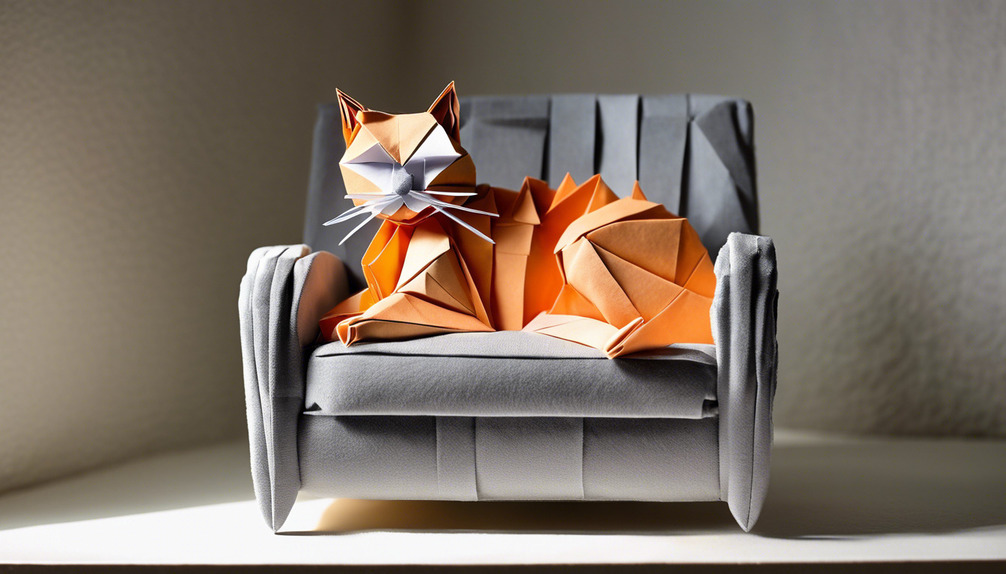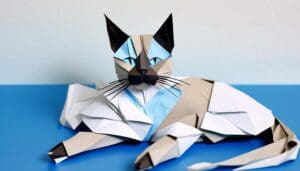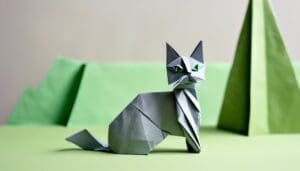As your cat ages, you might find yourself wondering about the importance of grooming for senior cats. It’s natural to question the necessity of grooming for a cat that seems to groom itself constantly.
However, as your cat grows older, their ability to groom effectively may diminish, and this could lead to a variety of issues.
Don’t worry – there are effective and kind methods to manage this new stage of looking after your older cat.
Key Takeaways
- Senior cats require special attention when it comes to grooming, as their fur, coat, hair, and skin may need extra care.
- Signs of matting in aging cats include tangled or clumped fur, unpleasant odor, and skin irritation. Promptly addressing matting is important for diagnosing underlying issues.
- Gentle and effective brushing techniques, using a soft-bristled brush or comb designed for delicate skin, are crucial for senior cats. Pay extra attention to areas prone to matting and be patient during grooming.
- Creating a soothing and relaxed environment for bathing, pat drying gently with a towel, and keeping the cat warm until fully dry are essential for bathing aging felines. Regular brushing helps prevent matting. Consult a veterinarian for guidance on bathing frequency and suitable shampoos.
Understanding Senior Cat Grooming Needs
As your beloved cat enters their golden years, understanding their senior grooming needs becomes increasingly crucial for their comfort and well-being. Senior cats’ fur, coat, hair, and skin require special attention to ensure they remain healthy and comfortable. Due to physical difficulties such as arthritis in their spine and hips, older cats may struggle with grooming, leading to matted fur and skin issues. It’s essential to address these grooming challenges with empathy and sensitivity.
Regular vet check-ups every 6 months are vital for managing arthritis and other age-related conditions in senior cats. These check-ups also allow the vet to monitor your cat’s fur, coat, and skin health closely.
When grooming your senior cat, creating a pleasant and calm experience is key. Using softer brushes and speaking in soothing tones can help ease any discomfort your cat may experience during grooming.
Matted fur in senior cats should be promptly addressed by a vet to diagnose and treat any underlying causes.
Signs of Matting in Aging Cats
Feeling the texture of your aging cat’s fur and noticing any tangles or clumps can be an indication of matting, which may signal underlying health concerns. As your beloved cat enters their senior years, their grooming needs change, and matting can become a common issue. It’s essential to pay close attention to signs of matting in your older cat’s fur, as it can be a symptom of various health problems. Here are some signs to look for:
| Signs of Matting in Aging Cats | Description |
|---|---|
| Tangled or Clumped Fur | Your cat’s fur may appear tangled, and you may feel clumps when petting them. |
| Unpleasant Odor | Matting can trap dirt and moisture, leading to an unpleasant smell emanating from your cat’s fur. |
| Skin Irritation | Matting can cause skin irritation and discomfort for your senior cat. Watch for signs of itching or redness. |
As your cat ages, regular grooming and proper brushing techniques are crucial to prevent matting. Seeking assistance from a groomer or vet is vital for managing matting and addressing any underlying health issues. Your older cat’s comfort and well-being are paramount, so staying attuned to signs of matting and addressing them promptly is essential.
Brushing Techniques for Senior Cats
When grooming your senior cat, it’s important to use gentle and effective brushing techniques to ensure their comfort and maintain the health of their fur and skin. As cats age, their grooming habits may change, and they might need a little extra help to keep their coats in top condition. Regular brushing not only prevents matting and tangles but also stimulates blood circulation, distributes natural oils, and reduces shedding, promoting overall skin and coat health.
Start by choosing a soft-bristled brush or a comb designed for senior cats’ delicate skin. Begin gently brushing in the direction of hair growth, paying extra attention to areas where matting tends to occur, such as behind the ears, under the armpits, and around the hindquarters. Be patient and offer soothing words to reassure your senior cat during the grooming process.
If you encounter any mats, carefully work through them with your fingers or a mat-removal tool, being cautious not to cause discomfort.
Bathing and Drying Aging Felines
You understand the importance of maintaining your senior cat’s coat health through gentle brushing techniques. Now, as you move on to the topic of bathing and drying aging felines, it’s crucial to create a soothing and relaxed environment for your cat, ensuring their comfort throughout the grooming process. When bathing an aging cat, use a soothing voice and ensure a calm environment to help them relax. After bathing, pat dry the cat gently with a towel and keep them in a warm area until fully dry to prevent chills.
Brush your aging cat regularly to prevent mats from forming, if they have difficulty grooming themselves. Consult a veterinarian for advice on bathing frequency and specific cat shampoos suitable for aging felines. Long-haired aging felines may require more frequent grooming sessions, including baths and detangling, to maintain a healthy coat and skin.
| Grooming Essentials | Aging Felines |
|---|---|
| Bathing | Soothing voice and calm environment |
| Drying | Pat dry gently and keep warm until completely dry |
Addressing Dental Care for Senior Cats
Regular dental care is essential for senior cats, as it can help prevent dental issues that may lead to reduced grooming behavior and discomfort. As your cat ages, their dental care becomes increasingly important. Consult a veterinarian to check the condition of your cat’s teeth and gums and for advice on maintaining your cat’s dental hygiene.
Dental pain or soreness can cause a decrease in grooming behavior in senior cats, impacting their overall well-being. Periodontal disease is common in cats and requires regular dental care to prevent it. Learning how to properly brush your cat’s teeth is crucial in maintaining their dental health.
Your senior cat may require special dental diets or treats to support their oral health. Remember, your cat may not always show obvious signs of dental issues, so it’s vital to be proactive in caring for their teeth and gums. By addressing dental care for your senior cat, you can ensure they remain comfortable, healthy, and continue to enjoy grooming and companionship in their later years.
Managing Mobility-Related Grooming Challenges
As your aging cat encounters mobility-related grooming challenges, it’s essential to adapt your grooming routine to ensure their comfort and well-being. It can be distressing to see your senior cat struggle with grooming, but there are ways to make it easier for them.
Here’s how to manage grooming challenges related to mobility:
- Use a grooming brush with softer bristles: Minimize discomfort during grooming by choosing a brush that’s gentle on your cat’s sensitive skin.
- Create a calming grooming environment: Make grooming a pleasant experience by using calm and soothing tones, and incorporating petting and verbal praise to reassure your cat.
- Regularly trim nails: To prevent ingrown nails and maintain mobility for senior cats, it’s important to keep their nails trimmed.
- Prevent mat formation: Brush your cat regularly in areas where they may have difficulty reaching due to mobility issues, to prevent mats from forming.
Grooming Products for Aging Cats
As your cat ages, you may notice changes in their grooming needs. It’s important to consider using grooming products with softer bristles to accommodate their delicate skin and be mindful of joint supplements for arthritic senior cats.
Brushing for Shedding
When grooming your aging cat for shedding, consider using brushes with softer bristles to minimize discomfort and soothe their sensitive skin. Grooming Your Senior can be a bonding experience and a way to show your love and care for your cat.
Here are some tips to make brushing a positive and beneficial experience for your aging cat:
- Gentle Approach: Approach your cat calmly and use soothing tones to create a relaxing environment for grooming.
- Regular Sessions: Schedule regular grooming sessions to remove dead hair and prevent mats and tangles in your cat’s coat.
- Soft Bristled Brushes: Choose brushes with soft bristles to gently remove loose fur without causing any discomfort to your aging cat.
- Patience and Reward: Be patient and offer treats or affection as a reward to make the grooming process a pleasant one for your senior cat.
Gentle Shampoos
After gently brushing your aging cat to minimize discomfort and soothe their sensitive skin, the next essential step in their grooming routine is choosing gentle shampoos specifically formulated for their needs.
When grooming a senior cat, it’s crucial to select shampoos with moisturizing and conditioning properties to nourish their aging coat for long-haired cats.
Look for hypoallergenic shampoos to minimize potential skin irritations and opt for natural ingredients to avoid harsh chemicals that may be too abrasive for their sensitive skin.
Ensure the shampoo is easy to rinse out to prevent any residue buildup that could further irritate your cat’s skin.
Preventing Skin and Coat Issues in Older Cats
With the onset of aging, senior cats require extra attention and care to prevent skin and coat issues that may arise due to decreased grooming habits and physical limitations such as arthritis. To take care of your older cat’s skin and coat health, keep these tips in mind.
- Understand the reasons for decreased grooming: Recognize the physical difficulty older cats may experience due to arthritis, which is common in cats over 10 years old, impacting their grooming habits.
- Manage arthritis in senior cats: Discuss joint supplements and pain medicine with a veterinarian and schedule regular check-ups to address any discomfort your senior cat may be experiencing.
- Implement grooming techniques: Show your senior cat extra love and care by using calm and soothing tones, incorporating regular brushing, and ensuring their nails are trimmed to prevent discomfort.
- Recognize the importance of regular vet appointments: Monitor your senior cat’s overall health, including blood pressure and early identification of any health concerns.
Seeking Professional Grooming Assistance
When it comes to caring for your aging cat, seeking professional grooming assistance can make a world of difference.
Professional groomers have the expertise to handle delicate skin and mat removal with care and precision, ensuring your senior cat’s comfort throughout the grooming process.
Their specialized knowledge and gentle approach can address specific grooming needs, providing the best care for your beloved cat.
Professional Groomer Benefits
Seeking professional grooming assistance ensures that your aging cat receives the expert care and attention needed to address specific grooming challenges and ensure a safe and comfortable experience. Here are some benefits of engaging a professional groomer for your senior cat:
- Expert Handling: Professional groomers can expertly handle grooming challenges such as matting and arthritis-related stiffness in senior cats.
- Proper Care: Groomers are equipped to handle delicate skin and sensitive areas in aging cats, ensuring a safe and comfortable grooming experience.
- Specific Needs: Professional groomers have the necessary knowledge and tools to address specific grooming needs of senior cats, like regular cat nail trimming and coat maintenance.
- Health Assessment: Seeking professional grooming assistance allows for a thorough assessment of the cat’s grooming needs and any underlying health concerns.
Entrusting your aging cat to a professional groomer can provide the specialized care and attention they need during grooming sessions.
Grooming for Senior Cats
For the aging cat, professional grooming assistance can offer specialized care and attention that addresses their unique grooming needs with expertise and compassion.
Senior cats often experience changes in their coat and health, requiring gentle handling and tailored grooming techniques.
Seeking professional grooming for senior cats is crucial for managing issues such as matted fur, which can be challenging for older cats to groom themselves.
Professional groomers can help maintain your cat’s coat to prevent skin irritations and discomfort.
Grooming sessions provide an opportunity to closely monitor your senior cat’s overall health, allowing for early detection of potential issues.
Expert Grooming Techniques
Make sure your aging cat receives the specialized care and attention they deserve by seeking professional grooming assistance. Expert grooming techniques can make a world of difference in managing your senior cat’s coat and overall well-being. Here’s why professional grooming assistance is crucial:
- Delicate handling: Professional groomers are skilled in handling aging cats with care, when dealing with matted fur that requires gentle expertise.
- Preventing injuries: Groomers can assess and address mats using proper techniques to prevent skin injuries or lacerations, ensuring your cat’s safety.
- Managing underlying health issues: Expert grooming techniques can help manage mats caused by underlying health issues in senior cats, providing holistic care.
- Specialized care: Groomers experienced in working with older cats can offer specialized care and handling for grooming sessions, ensuring a stress-free experience for your beloved cat.
Frequently Asked Questions
How Can I Help My Elderly Cat Groom?
You can help your elderly cat groom by using a gentle brush and providing a calm, soothing environment. Make grooming a positive experience by offering support and comfort. Check with your vet for any special care needed.
How Can I Improve My Older Cat’s Coat?
To improve your older cat’s coat, regular brushing and combing are essential. Seek assistance from a groomer or vet if needed. Also, ensure regular vet check-ups to address any dental issues or arthritis that may affect grooming.
What Kind of Grooming Brush for Senior Cat?
You’ll want a grooming brush with softer bristles that accommodates delicate skin and reduced grooming effectiveness for your senior cat. Regular grooming prevents discomfort and pain, making the task easier for both of you.
Should You Groom a 21 Year Old Cat?
Grooming a 21-year-old cat is important for its health and comfort. It helps avoid mats and injuries. Be careful and gentle, particularly around sensitive spots and joints.




